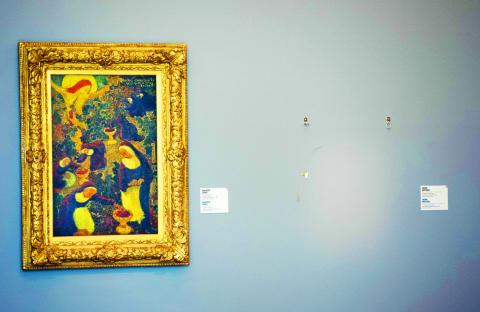A writer who thought she had found a painting by Pablo Picasso stolen in an infamous art heist six years ago on Sunday said that she was the victim of a “publicity stunt,” Dutch media reported.
Picasso’s Harlequin Head was one of seven celebrated paintings snatched from the Kunsthal museum in Rotterdam in 2012 during a daring robbery that local media dubbed “the theft of the century.”
The pieces by Picasso, Monet, Gauguin, Matisse and Lucian Freud have not been seen since.

Photo: AFP
However, Dutch writer Mira Feticu, who wrote a novel based on the brazen heist, thought she had uncovered the piece after she was sent an anonymous letter about 10 days ago “with instructions regarding the place where the painting was hidden” in Romania.
Feticu, of Romanian origin, told reporters that the tip-off led her to a forest in the east of Romania where she dug up a piece of art wrapped in plastic.
Romanian authorities, who were handed the canvas on Saturday night, said that it “might be” Picasso’s painting, which is valued at 800,000 euros (US$912,617).
However, on Sunday night, Feticu told Dutch public broadcaster NOS that she was the victim of a “performance” by two Belgian directors in Antwerp.
Feticu said she received an e-mail from the Belgian duo explaining that the letter was part of a project called “True Copy,” dedicated to notorious Dutch forger Geert Jan Jansen, whose fakes flooded the art collections of Europe and beyond until he was caught in 1994.
“Part of this performance was prepared in silence in the course of the past few months, with a view to bringing back Picasso’s Tete d’Arlequin,” Bart Baele and Yves Degryse wrote on their Web site.
Their production company “currently wishes to abstain from any comment” because it first wants to speak to Feticu, the statement read. “We will be back with more details on this issue within the next few days.”
Four Romanians were in 2014 jailed for the heist and ordered to pay 18 million euros to the work’s insurers.
One of the group, Olga Dogaru, told investigators she had burned the paintings in her stove in the sleepy village of Carcaliu to protect her son, Radu, when he could not sell them. She later retracted the statement.
Investigators have previously said that the paintings were destroyed after the thieves failed to find a buyer.
Specialists from the National Museum of Natural History in Bucharest examined ashes from a stove in Dogaru’s home and found traces of at least three oil paintings, based on lead and zinc-based pigments in blue, yellow, red and green that are no longer used, director Ernest Oberlaender-Tarnoveanu said.
The thieves slipped into the Dutch museum during the night of Oct. 15-16, 2012, and got away with the works, which, despite their value, were not protected by alarms.

POLITICAL PRISONERS VS DEPORTEES: Venezuela’s prosecutor’s office slammed the call by El Salvador’s leader, accusing him of crimes against humanity Salvadoran President Nayib Bukele on Sunday proposed carrying out a prisoner swap with Venezuela, suggesting he would exchange Venezuelan deportees from the US his government has kept imprisoned for what he called “political prisoners” in Venezuela. In a post on X, directed at Venezuelan President Nicolas Maduro, Bukele listed off a number of family members of high-level opposition figures in Venezuela, journalists and activists detained during the South American government’s electoral crackdown last year. “The only reason they are imprisoned is for having opposed you and your electoral fraud,” he wrote to Maduro. “However, I want to propose a humanitarian agreement that

ECONOMIC WORRIES: The ruling PAP faces voters amid concerns that the city-state faces the possibility of a recession and job losses amid Washington’s tariffs Singapore yesterday finalized contestants for its general election on Saturday next week, with the ruling People’s Action Party (PAP) fielding 32 new candidates in the biggest refresh of the party that has ruled the city-state since independence in 1965. The move follows a pledge by Singaporean Prime Minister Lawrence Wong (黃循財), who took office last year and assumed the PAP leadership, to “bring in new blood, new ideas and new energy” to steer the country of 6 million people. His latest shake-up beats that of predecessors Lee Hsien Loong (李顯龍) and Goh Chok Tong (吳作棟), who replaced 24 and 11 politicians respectively

Young women standing idly around a park in Tokyo’s west suggest that a giant statue of Godzilla is not the only attraction for a record number of foreign tourists. Their faces lit by the cold glow of their phones, the women lining Okubo Park are evidence that sex tourism has developed as a dark flipside to the bustling Kabukicho nightlife district. Increasing numbers of foreign men are flocking to the area after seeing videos on social media. One of the women said that the area near Kabukicho, where Godzilla rumbles and belches smoke atop a cinema, has become a “real

Archeologists in Peru on Thursday said they found the 5,000-year-old remains of a noblewoman at the sacred city of Caral, revealing the important role played by women in the oldest center of civilization in the Americas. “What has been discovered corresponds to a woman who apparently had elevated status, an elite woman,” archeologist David Palomino said. The mummy was found in Aspero, a sacred site within the city of Caral that was a garbage dump for more than 30 years until becoming an archeological site in the 1990s. Palomino said the carefully preserved remains, dating to 3,000BC, contained skin, part of the